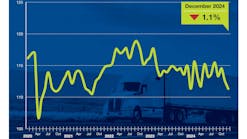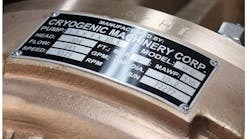Mexican Propane Company Develops Local and United States Markets
In 1947, a propane marketer in Ciudad Juarez, Chihuahua, Mexico, refused to sell fuel to Eduardo Fuentes' grandmother because she lacked a few centavos for the bill. Out of fuel for her stove that night, she served her husband a plate of cold beans for dinner.
"Her complaint was enough for my grandfather, Don Valentin Fuentes, to start a propane business of his own," says Eduardo, an owner of Grupo Fuentes.
Fifty years later, Grupo Fuentes of Ciudad Juarez, Chihuahua, and El Paso, Texas, provides residential and commercial propane service as well as product transport throughout northern Mexico and the US Southwest. About 800 vehicles make up the fleet of bobtail trucks, tractors, and tank trailers in both Mexico and the United States.
The company is one of Mexico's largest propane retailers with more than 30 outlets. In the United States, retail centers number 15. Annual sales are estimated at 130 million gallons - 120 million gallons in Mexico and 10 million gallons in the United States.
The conglomerate in Mexico includes commercial real estate, an industrial park, construction, a printing company, service stations, a tire recapping facility, a common carrier transporting company, diesel truck parts store, and automotive parts stores.
Company Flagship Despite diversification and growth, propane distribution remains the company's flagship business, says Eduardo. And, he points out, his grandmother likes it that way. His grandfather, almost 91 years old, remains active in the company-along with Eduardo's father, Eduardo Fuentes; his brother, Cesar Fuentes; and his sister, Magaly Fuentes.
"Most of the cooking and heating in Mexico are done with propane," says Eduardo. "We sell a mixture of 90% propane and 10% butane. The majority goes into cylinders, although bobtail deliveries are made to larger storage tanks, sometimes mounted on roofs."
The company's propane distribution in Mexico extends from Juarez into the interior as far south as the states of Coahuila, Chihuahua, and Durango. About 65% of the business is residential. Propane is delivered primarily in 100-pound cylinders to customers, but service and sales for propane appliances and conversion are available. The use of 125-gallon to 1,000-gallon storage tanks at homes and businesses is growing.
Residential and commercial deliveries are dispatched from offices in Mexico. Bobtails carry two-man teams, which makes it easier to maneuver hoses atop houses and businesses. Service to customers in Juarez is conducted from the company's headquarters across the border from El Paso. Dispatching for deliveries farther south is conducted from local area offices, including the cities of Juarez, Chihuahua, Cuauthemoc, Madera, La Junta, Delicias, Camargo, Jimenez, Parral, and smaller towns throughout Mexico. Drivers use two-way radios to stay in touch with dispatchers.
To keep up with the Mexican residential and commercial volume, the company operates 550 bobtail and flatbed trucks, says Ruben Ramos, general manager for ServiGas, the company's El Paso-based propane subsidiary. Most new bobtails are assembled at the Grupo Fuentes maintenance facility in Juarez. The 2,500- to 3,000-gallon vessels are made by Tatsa, a Trinity Industries licensee in Mexico and are mounted on Mexico-built GMC chassis. Equipment includes Fisher and Regal internal valves, Pipesa or CMS reels, Blackmer pumps, and Neptune Bestrac meters.
International Business Running a company in two countries requires a penchant for international business, even if the main offices are located nearby at the borders, says Eduardo. For example, the price of propane in Mexico is dictated by Petroleos Mexicanos (Pemex), the government-owned company that controls the market. While Grupo Fuentes must buy its product from Pemex for Mexican distribution, its subsidiary, Transpor-tadora de Juarez SA (Trajusa), has developed an additional relationship as a Pemex contract carrier.
The company operates 12,000-gallon, 40-foot propane trailers in pairs and conventional Kenworth T800 tractors. The doubles trains weigh 160,000 pounds and stretch 115 feet from nose to tail.
"Sometimes they have a team assigned, one person to drive and the other to serve as a spotter when trailers are backed up or when vehicles are being maneuvered on narrow roads," says Eduardo. "However, you really can't tell that there is any difference in individual trailers from those we use in the United States."
Although US and Mexican vehicles are very similar, they are kept separate for use in each country. A few of the Mexican fleet tractors are allowed into the United States at specific border trade zones. US-designated vehicles cross into Mexico at specific border trade zones and for maintenance at the company's full shop facility in Juarez.
All the MC330/331 tank trailers are purchased from Mississippi Tank Co, Anderson Columbiana Trading Corp, Dal-Worth Tank Co, Lubbock Tank & Trailer Inc, or Superior. Most have Fruehauf Trailer Services or Reyco Industries Inc suspensions. Recent purchases are manufactured by Mississippi Tank and are fitted with Fisher Controls valves and trailer-mounted Corken Inc pumps.
Mexican doubles trailers are connected by tandem dollies built by Grupo Fuentes at the Juarez maintenance facility. A Premier draw bar and Holland fifthwheel complete the assembly.
Heavy Loads Kenworth tractors are manufactured in Mexico and are powered by 435-horsepower Caterpillar engines that are chosen for their ability to pull heavy loads. The tractors, used only in Mexico, have Fuller rear ends and 18-speed transmissions.
In Piedras Negras, Coahuila, across from Eagle Pass, Texas, propane and butane are mixed at a company storage facility before it is trucked on to Mexican retailers. Another terminal is located in Matamoras, Tamaulipas, across from Brownsville, Texas. About 60 loads per day are handled at the two terminals, moving propane as far south into Mexico as 250 miles. To expedite the transportation, Grupo Fuentes shuttles drivers from Juarez to Matamoras and Piedras Negras. Almost all of the drivers in Mexico are based in Juarez.
Propane Service Propane service to residential and commercial customers in the United States is handled by ServiGas, which operates retail outlets in Texas, Arizona, and New Mexico. The central office in El Paso has 120,000 gallons of storage capacity. Five transports can be offloaded at the same time. Two rail sidings provide room for 10 tank cars, each with 30,000-gallon capacity, says Jay Magness, operations vice-president for Texas International Gas & Oil Co (Tingaco), the company's US subsidiary for wholesale, brokerage, and retail sales of propane.
Residential and commercial delivery procedures in the two countries differ in that customers in Mexico are concentrated in cities, while in the southwestern United States, long distances separate clusters of residents. Retail offices in the United States, in addition to three in El Paso, are in Arizona at Nogales and Tucson; and in New Mexico at Las Cruces, Deming, Silver City, Ruidiso, Alamogordo, Montana, Cloudcroft, Vado, Carrizoso, and Albuquerque.
Managers and dispatchers at ServiGas oversee service at the locations. Vehicle maintenance is conducted on site. In the US and Mexico, propane tanks are leased to customers and related services are offered such as vehicle or appliance propane conversion.
A large part of delivery and service volume is propelled by agriculture and commercial. Farmers use propane to power equipment, including pumps for irrigation. However, residential services commands 85% of the retail business.
Commitment to propane extends from customers to the company's fleet. New bobtail trucks, and some transports, have injection capability to mix diesel with about 10% to 15% propane. "Even this small amount is a big difference in saving money," says Paul Perez, ServiGas fleet manager in El Paso. Pickup trucks and cars are fueled 100% by propane. Bobtail trucks that have been in service for several years are fueled also 100% by propane.
Grupo Fuentes installs 50-gallon propane fuel tanks and Emco Wheaton components on converted vehicles. The in-house conversion saves the company about $10,000 to $15,000 per vehicle over a factory conversion, he says.
Twenty-seven new propane-converted Kenworth T300 bobtails have been added to the fleet for the expanding US market. Grupo Fuentes specified aluminum wheels, fenders, and hubs, lightened cab, and aluminum air tank. "It was a major change from what we usually buy," says Perez.
Grupo Fuentes has invested $2.2 million in the new bobtail trucks for use in the US. They are powered with Caterpillar engines. "The trucks have Allison five-speed automatic transmissions that increase fuel economy, have fewer drive shaft and rear end problems, and provide driver satisfaction," says Perez.
Bobtails Assembled The 3,500-gallon product tanks were fabricated by Trinity Industries, and the bobtails were assembled by Sales Equipment Co. Hardware includes Fisher valves, Liquid Control Inc meters, Corken pumps, Hannay reels, and Betts Industries lights.
The company recently put into service two bobtails with 5,500-gallon East Fabrication Company tanks on Kenworth T800 chassis. The vehicles are used to deliver propane from the companies' larger retail stores to customers.
Trucks are powered by 350-horsepower propane-injectible Caterpillar engines and Eaton nine-speed transmissions. Emco Wheaton equipment provides propane injection capability. Specifications also include Eaton air ride suspension, Alcoa aluminum wheels, and Michelin tires.
The new bobtails are equipped with Betts lights, Hannay reels, and Fisher and RegO Products valves.
Older bobtail trucks in the fleet are Chevrolets with Eaton five-speed transmissions. The trucks have lift springs, hydraulic and air brakes, Firestone tires, and the Emco Wheaton propane conversion equipment. The tanks came from several different manufacturers and assemblers, and equipment varies accordingly, says Perez.
Remote-controlled valve shutoff devices are on order from Sales Equipment Company Inc of Oklahoma City, Oklahoma.
In the United States, the majority of the propane is transported from refineries in West Texas and eastern New Mexico, and is delivered to company retail centers and other customers, says Magness.
Another Division Another division of Grupo Fuentes is Pakias Transport based in Houston, Texas. It was established in 1995. In January 1998, the company bought a business with 30 tractors and 43 propane trailers to expand into a for-hire carrier, says Ben Jones, Pakias operations manager.
Today, Pakias moves domestic propane tanks on flatbed trailers as far to the US Northeast as Baltimore, Maryland, and south to the Mexican border. Pakias has terminals in Texas, Oklahoma, and Louisiana. Drivers number about 60 and are dispatched from offices in Houston and Gainesville, Texas.
Although propane dominates the fleet, the operation hauls natural gas liquids from one refinery to another for specialized processing. Pakias also has 23 insulated tank trailers from E D Etnyre & Co and Trailmaster Corp used to haul asphalt in the US, says Jones. Ten 7,500-gallon tanks are aluminum and 13 are made of steel and have a capacity of 7,500 gallons. They are equipped with either Roper or Midland pumps.
Because of the seasonal nature of propane and asphalt use, drivers handle trucks carrying both products.
Pakias runs 29 Peterbilt tractors with 360-425 horsepower Caterpillar engines. Kenworth tractors used by Pakias are equipped with 350-horsepower Caterpillar engines and Eaton rear ends and nine-speed transmissions. Cabs are specified with extra sound deadening insulation. A few Freightliners are scattered throughout the fleet. The operation is in the process of replacing tractors with more than 700,000 miles on the odometer, says Jones.
The combined Mexican and US fleet is upgraded by 20 to 30 new power units per year as tractors are traded every 700,000 miles. Maintaining transport equipment falls to the immaculate Juarez facilities with 22 maintenance bays, one paint bay, and two exterior wash bays.
"I was criticized for having the walls painted white, but we only had to paint them once since then," says Eduardo. "The maintenance crews are given 15 minutes at the end of every work day to clean and put away their tools. We find that not only does this procedure preserve tools and equipment, it aids in employee retention. People prefer working with clean equipment."
Major Repairs Major repairs and preventive maintenance are conducted on US and Mexican tractors at the Juarez facility, says Magness. Vessel repairs on Mexican tanks are conducted at the shop, but US tanks are sent to code repair shops. Other maintenance such as alignment, brakes, tires, lights, and all preventive maintenance are performed in-house. Pakias Transport vehicles are usually maintained by third-party facilities, but some are worked on in Juarez.
The Juarez facility has propane storage capacity of 480,000 gallons.
All Grupo Fuentes driver training is conducted at the El Paso headquarters under the direction of Leonardo Borrego De Anda, safety director. In the US, drivers are designated for either bobtails or transports. "Our units are clean and well-maintained, so drivers like to drive them," says Leonardo. "We just don't have much of a driver turnover."
Pre-employment consideration requires alcohol and drug testing for Mexican and US drivers. Only experienced drivers are hired, but safety training is updated in monthly increments. Training covers hazardous materials regulations, emergency procedures, and other related subjects. Customer service is emphasized. Newly hired bobtail drivers spend three months in basic training on deliveries with another driver. "Our reputation is very important to us," says Leonardo. "Drivers don't just deliver the product. Delivery and service are interchangeable. We give the customer first priority."
The philosophy of Grupo Fuentes to emphasize customer service has grown from a housewife's simple need to 50 years of commitment. As part of its responsibility to local service, the company emphasizes community interaction. Grupo Fuentes' Tingaco has won the Clean Cities Coalition award from the City of El Paso. The company was honored for sponsoring environmental advertising for Fabens Independent School District.
As the population of northern Mexico and the southwestern region of the United States continues to grow, the market for propane is expected to follow suit, says Eduardo. He anticipates similar growth for the company. In fact, a company goal is to have as large an operation in the United States as is in Mexico. When growth comes, the company will be prepared, having developed the Mexican marketplace, established a firm foundation in the US, and adapted its fleet to serve customers in both countries.








